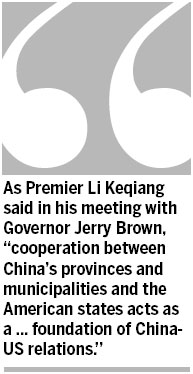Golden state for relations

California is keen to build on its long relationship with regions in China and is open to investment
A high-powered delegation from California, composed of business leaders and various government representatives, especially from the San Francisco Bay Area, has recently concluded a multi-city tour that has taken them to Beijing, Shanghai, Guangzhou and other places. The fruits of the visit are billions of dollars of deals, the signing of various memorandums of understanding relating to cooperation on the environment, investment, infrastructure, agriculture, tourism and electronics, as well as the new friendships that have been forged.
The California-China relationship is a long one, stretching back more than 160 years. And by any measure, it is now an incredibly broad one.
China is California's third-largest trading partner, the recipient of billions of dollars worth of investments by major California companies such as Intel, Gap and Hewlett-Packard, and the source of thousands of foreign students and many famous entrepreneurs. California architectural and real estate companies, investment companies such as Silicon Valley Bank, and accounting and law firms have all manner of partnerships with Chinese entities. There are also an impressive number of ongoing exchanges between Chinese and California educational institutions, such as Shanghai Jiaotong University and the University of Southern California, non-government associations and scientists.
For its part, California has welcomed almost 29 percent of China's investment in the United States. It is the home to the largest number of Chinese in the country and runs the ports through which most Sino-American trade is conducted. It also takes one-third of the imports from China. The relationship only promises to become a more extensive one with the Chinese Ministry of Commerce forecasting hundreds of billions of dollars of investment in California by 2020 and even the Inner Mongolia autonomous region is exploring cooperation with the Golden State in agriculture and new energy. California Governor Jerry Brown emphatically stated in Beijing: "We are totally open to China."
While trade will continue to be a vital part of the relationship, it is clear that Chinese companies and individuals will focus increasingly on investing in California. This is quite understandable. According to State of California statistics, California has the US' largest population and GDP, a large percentage of Fortune 500 companies, median family incomes larger than the national average, the largest number of foreign-born entrepreneurs, and capital needs in a number of areas. Furthermore, California remains a technological powerhouse. It's home to many of the world's most renowned hardware, software, and biotechnology companies and it has many world-class universities, the largest concentration of engineers, scientists, and skilled technicians in the US, is the top state for patent production, and a treasure trove of venture capitalists and incubators.
Chinese companies are quite aware of these strengths and are quite keen to access new markets, construct distribution, sales, and service networks, develop research labs, acquire technologies, and find higher yielding investment opportunities in the state. Even wineries have proved attractive to Chinese investors.
To succeed in California, Chinese investors will have to pay attention to many variables, including California's tax and regulatory structure, sensitivities about foreign investment generally and technology loss and theft specifically, the state's stringent environment standards and the California population's high environmental expectations, job creation and job losses and relations with unions, and various corporate social responsibility requirements.
Ultimately, just as Chinese officials, opinion makers and citizens want foreign investors in China not just to make money but to contribute to China's development and the well-being of its people, similar constituencies want Chinese companies to make similar contributions to California. For its part, as a 2006 Bay Area Economic Forum report made amply clear, California will need to, among other things, offer services of all kinds to Chinese investment delegations and investors, continue to nurture the state's economy, provide better support for education and infrastructure, enhance Chinese language education, perhaps in conjunction with Confucius Institutes, and find ways to encourage cultural, business, and educational exchange.
Trade and investment is an important part of the China-California relationship. But trade and investment has the potential to do far more than fatten people's pockets. As Premier Li Keqiang said in his meeting with Governor Jerry Brown, "cooperation between China's provinces and municipalities and the American states acts as a significant river and foundation of China-US relations." At a luncheon hosted by the leaders of the Shanghai Yangpu District to celebrate the opening of the aforementioned California trade and investment office, which I attended, Governor Brown echoed these sentiments.
If China-California trade and investment not only continues to prosper, but leads to more understanding and better ties between Americans and Chinese, which will naturally help the overarching business environment, then the California-China relationship truly will have reached a golden state.
The author is assistant dean for International Cooperation and Exchange and Professor, School of International and Public Affairs, Shanghai Jiaotong University.
(China Daily 04/24/2013 page8)

























